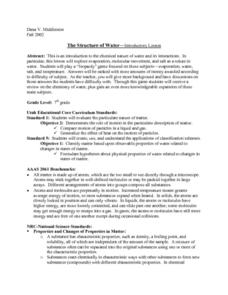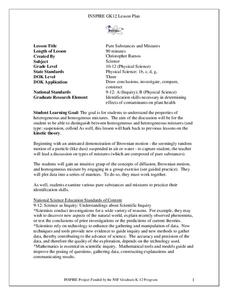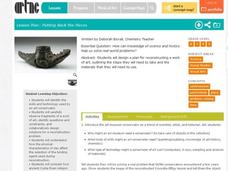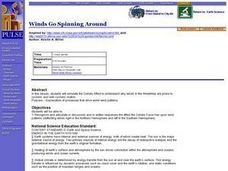NOAA
Ocean Zones
How can organisms light up in water? Bioluminescence is light produced in a chemical reaction that can occur in an organism's body. First, learners determine what happens to light/color as you move into the deep ocean. In groups, they...
Curated OER
The Chemical Nature of Water
Seventh graders simulate a Jeopardy game to examine the chemical nature of water. Among the topics featured are evaporation, water, salt, and temperature. finally, as review, 7th graders answer a battery of questions presented by the...
Curated OER
Phases of Matter
Students describe the motion of solids, liquids and gases. In this chemistry lesson, students describe how temperature affect motion of the particles. They determine the physical properties of each phase.
Curated OER
Pure Substances and Mixtures
Students compare and contrast the properties of substances and mixtures. In this chemistry lesson, students simulate spontaneous mixing by performing a short class activity. They differentiate heterogeneous and homogeneous mixtures.
Curated OER
Putting Back the Pieces
Seventh graders become museum conservators and undertake the hypothetical restoration of an ancient American work of art. Groups design a plan for reconstructing the work of art, outlining the steps they need to take and the materials...
Curated OER
Lotic Environment Lesson Plans
Students create and conduct experiments on a "classroom river habitat." They manipulate the biotic and abiotic factors so that they are able to compare an artificially prepared river model to a naturally occurring lotic ecosystem.
Curated OER
Winds Go Spinning Around
High schoolers simulate the Coriolis Effect to comprehend why winds in the Westerlies are prone to cyclonic and anti-cyclonic motion. They arrive at an explanation of processes that drive world wind patterns






